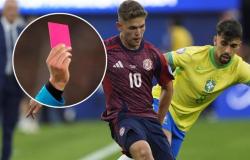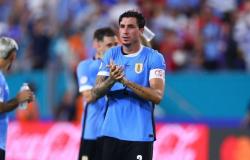It happened again in the 87th minute of the second leg of the Champions League semi-finals between Real Madrid and Bayern Munich at the Santiago Bernabéu.. Vinicius, from the edge of the area, tests Neuer with a bitten shot that bounces and the German blocks without problems. Or, at least, apparently, since the ball slips between his gloves to serve the tie on a silver platter to Joselu in the small area and begin to put on the superhero cape of another miraculous comeback. This, too, with the backdrop of the inexplicable Madrid mystique with its fetish competition. It was not Kane who was the curse of Bayern, but rather the least expected, Manuel Neuer.
Until that moment, The German goalkeeper (40 years old), with several master’s degrees in these parts, was the MVP of the game, keeping his team alive and unhinging Vinicius and Rodrygo with up to five interventions of merit. Two of them, consecutive, superb. “It’s tragic, but no reproaches,” said the club’s sporting director, Max Eberl. Like Thomas Tuchel, also apologizing to his goalkeeper: “Out of 10,000 times, Manu saves the ball 10,000 times. This was number 10,001. It is ruled out that you make a mistake. And he commits it precisely today after a world-class game.” Like Neuer himself, who, like Pep Guardiola in the quarterfinals, alluded to the state of the grass: “I have to say that I expected the ball in a different way, more towards my chest. He went a little higher and didn’t expect there to be a small ‘molecule’ in the grass. It is very bitter to be eliminated in this way with a 0-1 score until the 85th minute of the game.”
“Out of 10,000 times, Manu (Neuer) saves the ball 10,000 times. This was the 10,001″
Once again saved ‘in extremis’, once again driven by the rival goalkeeper’s mistake after creating doubt where there is none. Two years later, Madrid returned to a Champions League final with a goal to speed up the epilogue but, like so many other times, with the rival goalkeeper’s failure as the turning point. The fine print of your story. Since Opta, a sports statistics provider, launched its database (2007/2008), The white team is the team that has scored the most goals in the top continental competition after obvious errors by the rival goalkeeper (25). Haunting, luck? Simple coincidence or causality? Is there any feasible explanation?
The self-fulfilling prophecy
Along with Neuer, Alisson Becker, Édouard Mendy, Gianluigi Donnarumma, André Onana or Loris Karius (twice) are some of those who have been failures against the whites. Some of them, unusual in elite goalkeepers. But behind it lies an emotional and sporting explanation. “He has that tradition in Europe that, when teams face him, they cannot deny that there is added pressure”explains Marcos Abad, goalkeeping coach at West Bromwich Albion with experience at Elche or Leeds United. His professional colleague, Emilio Álvarez (Valencia, Atlético de Madrid, lower categories of Madrid or Manchester United), speaks of a kind of “intangible vectors” that ““they increase the responsibility and tension with which to face the game”. Among them we could mention the universal projection of whites.
“I think it is the only club in the world that has that aura, that intoxicating aroma and champion DNA that spreads to every corner”Abad continues reflecting. For Esteban Suárez, former goalkeeper for Sevilla, Celta, Almería or Atlético de Madrid, on the other hand, he does not believe there is a logical explanation. Although he does allude to the fact that the accumulation of errors can affect the rival. “The team itself, not just the goalkeeper, who plays against Madrid begins to think ‘what if it happens again?’ What if it comes back again?’ The team suffers more, goes further back. And it ends up happening,” he details.. “I saw PSG live and players like Neymar, Messi and Mbappé became small. Not just Donnarumma, them too,” he explains about the white comeback at the Bernabéu in 2022.
Oliver Kahn, former general director of Bayern between 2021 and 2023 and who attended the match as a guest of honor of Real Madrid in the box, compared Manuel Neuer’s mistake with his own in the 2002 World Cup final, where Germany lost 0 -2 against Brazil with two goals from Ronaldo. Kahn reflected on the parallel: “In 2002 we still had time ahead of us. Unfortunately, Manuel made a mistake in the 88th minute. Before that he made great saves. That is part of the brutal life of the goalkeeper“, says one of Bayern’s greatest legends.
But there is also a psychological explanation. María Eugenia Ventura, psychologist and sports coach, alludes to the concept of self-fulfilling prophecy. A prediction or expectation about a future event that, when believed by a person or group, influences their behavior in such a way as to transform the prediction into reality. “If any Bayern player believed after the goal conceded ‘we could lose’, ‘it’s Real Madrid’ or ‘they’re going to do it again’, that belief could lead them to feel anxious and unsure of themselves for the rest of the match, which could negatively affect their performance and cause them to actually fail. In this case, it becomes a reality,” he states.
A legend of countless chapters
Madrid is the team that has scored the most goals in the Champions League after mistakes by the rival goalkeeper, but it also leads this list with a wide difference compared to the following: they are followed by Manchester United, Barcelona and Liverpool with twelve. PSG and Bayern, eleven goals. Furthermore, 14 of those 25 Real Madrid goals have been in qualifying rounds. But, the miss-goal sequence is not limited to the Santiago Bernabéu: 48% of these goals were scored with the white team playing as a visitor. Of the last seven, only three have been at home. Dani Carvajal also believes this, who can match Gento with six Champions Leagues: “We create fear, we create terror in our rivals”. That Madrid is part of the competition due to history and background influences the atmosphere.
Thus, the esotericism of the Bernabéu on Champions League nights would not be the only possible factor. The contextual imprint of the recent white European miracles, explains Álvarez, translates into pressure or negative thoughts about the feasibility of their repetition.. “The physical, technical and tactical component can be trained, but facing Madrid does take you to a very high psychological level of pressure. As coaches, we strive in our work to reduce that factor as much as possible, we are going to call it luck, but in the end when talent emerges it is unexpected and turns it into that beautiful sport that makes everything change,” he concludes.
The route of the ‘Fourteenth’, in which Madrid mixed football and magic like never before with three exploits against PSG, Chelsea and Manchester City, reinforces this theory. In fact, In the last five ‘Orejonas’ that Madrid has won, there has been at least one error by the rival goalkeeper that ended with a merengue goal. A fact that is based on another column: the physical and technical demands of the white team and the competitive voracity that is found in the Madrid DNA, which exponentially multiplies the harassment of the rival goalkeeper.
“In my time, when Cristiano Ronaldo, Benzema and Morientes were there… they are insatiable,” says Esteban, who has faced Madrid several times. in the League, a competition in which the Castellana club is also the team that has scored the most goals after mistakes by the rival goalkeeper (58, followed by Sevilla with 44). “They play to win and for their personal ego. They are not conformist teams, they have players who want to shine collectively and individually,” says the former goalkeeper, who adds that “when you are tired and you get careless, that is when they are voracious.” All this without mentioning the expectation prior to confronting them, which increases the pressure: “The previous week was very different. Because there was much more media presence, more requests for interviews…”
Behind this lies a characteristic of Madrid’s playing factor, ‘organized madness’. “He has that offensive variability, very decisive in transitions. And goalkeepers can define competitions and objectives, which is the ability to dominate space,” Abad details. He also points out the relevance of, in this context, the goalkeeper making an aggressive or conservative decision so as not to facilitate the attacker’s definition, which “keeps him in constant tension. That is key in Madrid, because Rodrygo or Vinicius are players who live in space, and with that speed it is key that the goalkeeper has the coolness and temperament to not rush into action or, on the other hand, be more aggressive to resolve that one against one.”
“Yes, there is a higher level of alert than in other types of matches”, adds Abad. This is what happened with Neuer, affected by a hasty decision in the tying goal when he was trying to start a quick counterattack: “That loss later affects him in that shot, which ends up being a block with some difficulty because the ball bounces in an aggressive way that he can’t. wait and that he tries to do a technique that at the moment of the bounce, being aggressive, is no longer correct. But prior to that there is a poor body position which is what causes the ball to be rejected and that second play is generated,” he explains.
Madrid faces a wall
Borussia Dortmund may not have been the best team in the competition, but their goalkeeper was: Gregor Kobel. At least, statistically. For a long time, and well. The 42 stops he has made in eleven games are unparalleled, as Atlético de Madrid and PSG could see. Part of the feat of the aurinegro team falls on his shoulders. Kobel has conceded only seven goals, with an 84% effectiveness rate (42/50), which makes him the goalkeeper who has prevented the most goals, with seven, according to Opta’s expected goals against (xGA). Will he fall prey to the fear theory?
Follow the Diario AS channel on WhatsApp, where you will find all the sport in a single space: the news of the day, the agenda with the latest news on the most important sporting events, the most outstanding images, the opinion of the best AS firms , reports, videos, and some humor from time to time.






